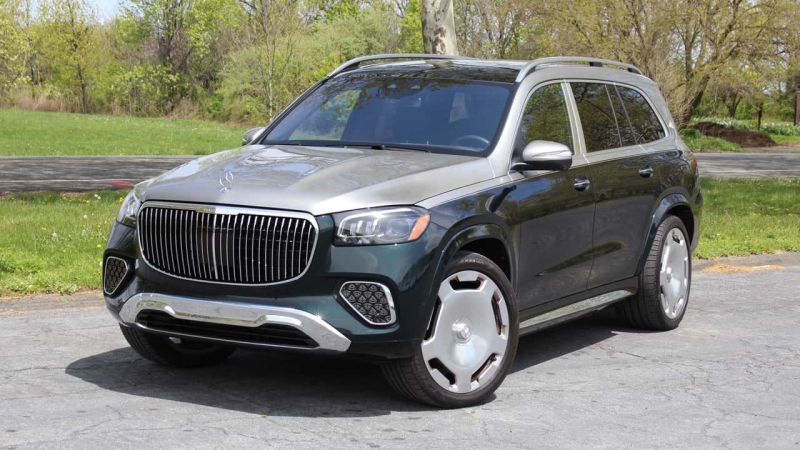The Maybach GLS is bigger, more comfortable, more spacious, and has more presence than anything in its price range.
For the longest time, I considered the Mercedes-Benz S-Class the pinnacle of luxury. Aside from fringe, low-production, ultra-high-cost brands like Bentley and Rolls-Royce, the S-Class and its Maybach-trimmed equivalents were the reference points by which all other luxury cars were judged. But no longer.
For me, that car is now the 2024 Mercedes-Maybach GLS600. It’s built specifically to deliver an unmatched luxury experience for four passengers, and delivers one of the most comfortable, relaxing, serene experiences you can have behind the wheel of a vehicle.
| Quick Specs | 2024 Mercedes-Maybach GLS600 |
| Engine | Twin-Turbo 4.0-Liter V-8 |
| Transmission | Nine-Speed Automatic |
| Output | 550 Horsepower / 538 Pound-Feet |
| 0-60 MPH | 4.7 Seconds |
| Base Price / As-Tested Price | $174,350 / $203,700 |
Of course, the driver’s seat isn’t really where you want to be. The Maybach GLS600 is best experienced from the lounger over the driver’s right shoulder. In order to fit the recliner-like range of adjustment in that seat, Mercedes deleted the third row and moved the second row back, unlocking up to 52.8 inches of legroom—enough for the passenger-side occupant to fully stretch out their legs with the front passenger seat moved forward. It’s the closest thing on wheels to first class on a transatlantic flight.
The seats do more than recline. There are heating, cooling, and massaging elements for all four travelers. Go for the $1,800 refrigerator option and you’re also given a space in the back to cool your champagne, along with two champagne flutes. A frivolous add-on, especially once you consider it’s illegal to drink in a car while it’s moving in most states. But it’s still extremely cool, and fun to show off to friends.
Moving to the front row unlocks more seating adjustments. In addition to the heating, cooling, and massaging, you also get electronic lumbar and bolster adjustments. But strangely, neither are adjustable via physical buttons. Instead, they have to be accessed through the infotainment screen—not a fun experience, especially while driving.
Thankfully there are physical buttons on the dash for most other important functions, including climate control, drive mode selection, height control, and volume. Where things get messy is the steering wheel. There are buttons here, but they’re the touch-capacitive type Mercedes has used on the latest generation of its lineup.
To make small adjustments to things like cruise control or volume, you have to touch-swipe on sliders without pressing down on the actual button. Not only is this difficult while you’re moving, but it also produces inconsistent results. Sometimes I’ll get my input right with the volume, but other times I’ll accidentally turn up the sound by 100 decibels and blow out my eardrums. Even when I’m not attempting to press anything, the steering wheel might erroneously detect a false input. It’s annoying.
The most-egregious part of these steering wheel controls is the lack of a skip-track button. Mercedes is the only mainstream manufacturer I can think of without a button like this on the steering wheel, forcing you to go to the infotainment screen for the next song in your playlist. I was hoping they’d fix it for this ‘24 model year refresh, but alas.
You may forgive Mercedes for these touch controls as soon as you start driving the GLS600. Every input has been tailored to be as smooth and buttery as possible. The steering weight never changes, no matter how gentle or aggressive you are with your inputs, while the brake pedal is soft and progressive, bringing the car to a calming, undisturbed stop every single time. The accelerator pedal is an equally delicate affair, weighted and tuned for the driver to bring the GLS up to speed unobtrusively. These little things add up.
For decades, the “600” moniker on the back of a Mercedes meant the car had 12 cylinders. While the 4.0-liter under the hood lacks numbers-related heritage, its 550 horsepower means you’ll never lack for straight-line grunt. The GLS600 is plenty quick for what it is, with enough low-end push to get the leather-clad behemoth to 60 mph in under five seconds. And weirdly, it sounds great doing it.
You’d think a Maybach-branded vehicle would attempt to shield its drivetrain from its occupants, but that’s not the case for the GLS600. The twin-turbo V-8’s rumble is surprisingly present in the cabin, audible both at idle and while on the move. I don’t mind it, obviously. The more V-8 sounds in my day-to-day, the better. But I could understand why someone looking for the ultimate luxury experience might be bothered by the sound of firing cylinders disrupting the silence.
The engine isn’t the center of attention in the Maybach GLS, though. That honor belongs to the suspension. This is one of the few air-ride systems I actually enjoy. Unlike most air springs, the GLS600 manages to settle into a cloud-like ride that glides over bumps without a hint of disruption to the cabin. It’s only the really big imperfections you feel, but even then, it’s a step up in quality from any S-Class I’ve been in.
A lot of that performance comes thanks to what Mercedes calls E-Active Body Control. The pressure of the dampers is controlled via hydraulic pumps powered by 48-volt electric motors, meaning the system can quickly react to body roll and stabilize the SUV through uneven terrain and lateral movements. In “Curve” mode, it can also persuade the three-ton Mercedes to lean into corners, dropping the inside dampers and raising the outside dampers. It’s a bit disorienting at first, but wildly impressive once you get used to it. All of this is especially cool once you account for those $6,000 forged 23-inch monoblock wheels. Even with that lack of sidewall, this suspension tech can still perform miracles.
While they can be a bit tacky on the G-Class, those wheels are a must-have when speccing out your Maybach GLS600. Our tester also had an $18,500 optional two-tone Emerald Green over Mojave Silver paint job, further spicing up the curb appeal. I must’ve received a dozen compliments in my short time with this car, including one man who insisted I wait to leave my parking spot while he grabbed a selfie with the front bumper. I don’t blame him; this thing has a serious presence, one that has me second-guessing whether the G-Wagen is still the ultimate Mercedes SUV.
Even more attractive is the price. $174,350 is an incredible amount of money, yes, but it’s a relative bargain once you compare the GLS against its main competitors, the $205,925 Bentley Bentayga and the $391,750 Rolls-Royce Cullinan. Those trucks might have the Maybach beat on power and front cabin quality, but the Mercedes rides just as well and delivers an unmatched backseat experience. If I had to ride in the backseat of one for the rest of my life, I know which I’d choose.
Competitors
- Bentley Bentayga
- Rolls-Royce Cullinan
- Aston Martin DBX707
Get the best news, reviews, columns, and more delivered straight to your inbox, daily. Sign up For more information, read our
Privacy Policy and Terms of Use.
Gallery: 2024 Mercedes-Maybach GLS600 Review
2024 Mercedes-Maybach GLS600
Engine Twin-Turbocharged 4.0-Liter V-8
Output 550 Horsepower / 538 Pound-Feet
Transmission Nine-Speed Automatic
Drive Type All-Wheel Drive
Speed 0-60 MPH 4.7 Seconds
Weight 6,085 Pounds
Efficiency 14 City / 19 Highway / 16 Combined
Seating Capacity 4 / 5
Towing 7,700 Pounds
Cargo Volume 14.0 Cubic Feet
Base Price $174,350
As-Tested Price $203,700
On Sale Now



